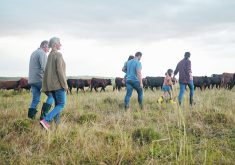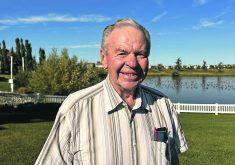Farm transition, succession or estate plan is difficult, but posing scenarios or telling stories helps guide the discussion
At the end of October, Clint Fischer, an American farm estate and succession plan lawyer, posted the following comment to his X account.
“You’re presented an opportunity to work for a retiring farmer and own the operation over time. What are your concerns? Not free, you’ll be buying into the operating entity at a discount.
“Land is in different entity with 30-year leases in place.”
Fischer lacks the answers, but his posts were designed to elicit responses and have people ponder the questions and maybe their own succession plans.
Read Also

Short rapeseed crop may put China in a bind
Industry thinks China’s rapeseed crop is way smaller than the official government estimate. The country’s canola imports will also be down, so there will be a lot of unmet demand.
One responder posted: “First I would want to know the entity structure, production operating model, cash flow, liabilities and assets.”
Another responder said: “This is how I got my start. It worked really well. Where we struggle now is he still owns the land and lives on the farm. I get phone calls regarding when I am going to plant, weed management etc., I wish I would have considered this part when I entered into this arrangement.”
Fischer said he has always learned best through stories and real-world examples. Posting scenarios is one way others can learn from the real life stories he hears from his clients.
“It is one thing to talk about some financial or legal principle out of a textbook and people’s eyes kind of gloss over, but if we can apply that to real life in a real-world scenario where people have emotional ties and emotional reactions, it is going to be more impactful. We will remember that lesson,” said Fischer, of South Dakota.
“I try to portray that on posts and try to keep it fairly objective and say here is the scenario, this is what happened and then people just naturally gravitate towards stories they can relate to or have opinions on. It is a weird dynamic posting things publicly, but to see people have an open mind and to change their positions is pretty cool and speaks to the power of storytelling versus just listing off the facts.”
Working through a farm transition, succession or estate plan is difficult, but posing scenarios or telling stories often helps guide the discussion on what has worked and hasn’t worked for previous clients.
Before a farm succession plan discussion begins, Fischer requires the retiring farming family and the potential new successor separately fill out questionnaires on their goals and objectives.
“This isn’t a round table where we all agree. This is the vision of the owner generation and the vision of the incoming generation and then you sit down and put those goals and objectives side by side and say here are some areas where we are aligned and here are some areas where we are not aligned. Where can we compromise, or where can make these work in order to maintain the viability of the farming operation.”
“We as advisers, we’re not there to make decisions for people. We can say what has worked, or what hasn’t worked in other situations.”
Fischer also requires the parties complete an inventory of assets to eliminate any guessing of the value that is being transitioned or even up for discussion. A succession plan or transition plan incorporates the next generation in the discussions about the future and everything needs to have a clear value.
“This isn’t come in for a one-hour meeting and leave with a transition plan. It takes effort and I think that is one of the reasons why it is easily procrastinated, it is easily pushed off. It is one of those necessary components for every business for every farm, ranch, but you don’t see a return on that investment right away.”
In his Braintrust Ag business, Fletcher curates an online discussion with farmers from across the United States and Canada. The online coffee shop, without the local gossip and weather, was a way Fletcher could address recurring farm business, succession and transition questions and help create an on-line farming community.
Fischer said Canadians often preface their question that they’re Canadian and their questions may not apply, but he tells them usually sound business management principles don’t know borders.
“There might be different legal tools or tax consequences, but the general theme, it doesn’t matter where you are located. There are still the same sticking points and the same main principles you need to follow.”
Just like Canadian farmers, one of the often-asked questions by his American clients is how to treat the non-farming children fairly. While talking about non-farming children is often a public topic, it is not as difficult to deal with when the serious discussions begin, he said.
The farm owner usually has an idea of how they would like to make it work. They just need to understand the tools they can use to achieve it.
Fischer points to a recent succession plan that involved children and good discussion. His client wanted to know how to retire, but also wanted to know the best way to plan his estate with his long-time girlfriend, her two sons and his own son, who worked in town.
“There was an assumption by the father that the son didn’t want to take over. But he had never talked about it with his son. The son had always wanted to come back but never talked about it with dad.
“The gist was coming in; he just wanted an estate plan. Everything was going to get sold and the land rent would pay for his retirement. That was what was in his mind until he started discussing the question of how much to leave the kids. Through the discussion, he talks with his son and now the son will come in and rent some off the ground and use his father’s equipment,” said Fischer.
“Now this farm is going to last another generation, but that wasn’t the plan coming in because the communication wasn’t there. They never talked about the idea. I am hopeful for that young guy coming in, maybe he is going to make a go of it with his dad with his dad’s mentorship and guidance. Without sitting down and going through this planning process, this thing could have gone to the neighbours and but that farm would not have existed. Now we have an opportunity for the next generation to take over.”
A trend Fischer has started to see is older farmers without a natural successor for the farm. Either the farmer has no children or grandchildren wanting to farm. But with the desire to keep the farm intact, Fischer is working with farmers, who are putting out feelers, like a job application, to see if someone is interested in taking over the farm.
“That is one area I am seeing more interest in. I am working with a couple guys right now. One doesn’t have someone identified to take over. We are going to run it like a job application and have people apply and become a candidate to take over this business one day.”
While there are some hurdles having a stranger gradually take over the farm, including values, work ethic and farmers giving up control, it may allow younger farmers to enter farming.
“What I am hopeful for is that it will allow more of these second, third, fourth generation farms that no longer have kids interested in running, to be maintained as an independent farm rather than be pulled apart. I run into young people all the time looking for opportunities. What I am curious about is the supply side on the retiring side. Is there enough motivation to keep legacy intact or is it just easier to rent out to the neighbours?”















